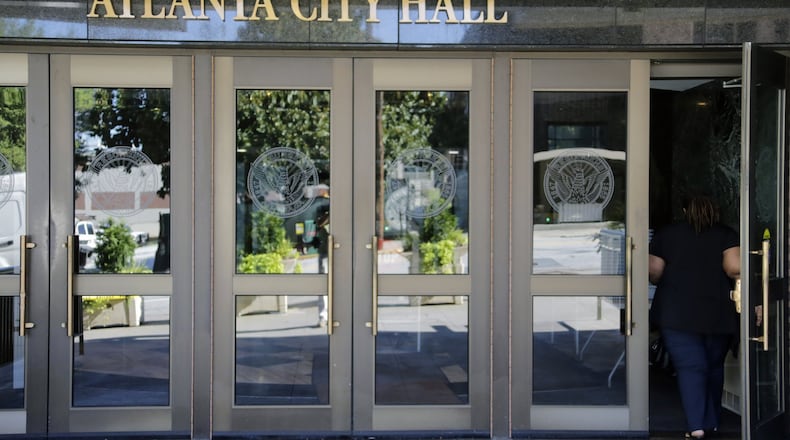After a long relationship with the Atlanta General Employees’ Pension Fund, money managers from an Atlanta investment firm were in the hot seat.
GLOBALT Investments had drawn returns that appeared to be at least $1 million short of the goal, records showed. Hired to sweeten the $1.3 billion pot of retirement benefits, the firm wound up on a watch list because of underperformance. The pension board wanted to know why the firm missed its target.
A year later, a consultant’s report shows the firm remains on the watch list and is still handling investments for the fund.
Lackluster results from some money managers was one reason the City Council in December 2017 voted to consolidate oversight of the general employees, police and fire retirement funds under a single board. The move, city officials said, would result in smarter investment decisions – vital because, with the funds short hundreds of millions of dollars, taxpayers could be on the hook.
The city also said the move would improve transparency, so the public could be confident that the funds were being safeguarded.
So far, the new board has failed to deliver on either count, The Atlanta Journal-Constitution found after examining dozens of public records, interviewing city leaders and employees, and obtaining some financial documents from confidential sources.
The board held only sporadic meetings in 2018, and they were bogged in administrative issues and marred at times by confusion. One issue: elections for a board trustee to represent the city’s largest fund, the General Employees’, was repeatedly bungled, documents show.
Records also indicate that until late November, the new board didn’t do a substantive review of investment performance.
And the city stalled on releasing information about that meeting. The AJC didn’t receive the agenda until late Thursday — a month after requesting it – and it wasn’t until Friday afternoon that the city gave the AJC some documents provided to members at the meeting, although the state Open Records Act requires records to be produced promptly.
The board chairman said the board is moving in the direction to fulfill its duties to the city and the public.
"In a very general sense, we are progressing very well,'' Frank Sims, who was appointed by Mayor Keisha Lance Bottoms, told the AJC.
He said the board met “timely with all consultants.” In addition to the November meeting, he said he attended a December session with consultants to review investments, though the city says there was no board meeting that month. The board has another meeting late this month to discuss investments, Sims said.
“It would be a disservice to the committee to suggest that we’re not doing our duties right now,’” he said.
The city says the board decided early on to hold off on any substantive changes about investments until elected board members were seated. Police and fire representatives weren’t seated until late September and the General Employees’ rep late in the year. Had there been a need to shift funds, that would have happened, city officials wrote.
An official of GLOBALT declined comment, saying the firm does not share information without written consent of clients.
Pension experts told the AJC that if the board didn’t focus on money managers and investment performance for months, they could have put the funds at risk.
Seasonal changes in pension costs, as well as sudden swings in the stock market, can have a serious impact on funding, said Max Patterson, a member of the executive board of the Government Finance Officers Association. That's why it's important to scrutinize financial data on a regular basis, he said.
Mike Stolte, a Minnesota-based auditor of large pension plans and endowments, sees the lack of regular board monitoring as a "monster issue." Even though boards have consultants to keep watch on investments and make recommendations, the board is responsible for hiring, evaluating and firing money managers, he noted.
Alexander Lowry, who directs a graduate program in financial analysis at Gordon College in Boston, said it was probably a good idea, in principle, for the city to have consolidated the pension boards. "There's probably good economies of scale," he said.
However, he said a board can only be effective when it is conducting its primary business. That is, "to monitor progress at every meeting," said the former executive at JPMorgan Chase & Co.
A lack of transparency
The ordinance the council approved in late 2017 requires that basic public documents about the pension funds, including meeting minutes, be posted online. The ordinance also requires members of the new board to be trained in open records and open meetings laws, among other things.
Such transparency is expected of public pension plans, said Keith Brainard, researcher for the National Association of State Retirement Administrators, whose members oversee more than $4.2 trillion in assets.
To gauge the health of pension systems, reports that detail the performance of money managers, quarterly investment returns and other data should be public, he said. “This day and age, there’s really no excuse for information like that not to be readily accessible,” Brainard said.
But the AJC is still waiting for some records requested as far back as November.
And the city hasn’t yet posted pension data online, or board minutes where employees could find them.
Bottoms’ spokesman Michael Smith said that posting the information was a “top priority” but that last April’s ransomware attack, where hackers knocked out the city’s computer network, forced delays.
As for the delays in providing records to the AJC, Smith said Thursday that the city was attempting to obtain some records from the pension’s administrator, such as the tape recording of November’s meeting.
Minutes from the November meeting, Smith said, would be provided after the board approves them at its Jan. 23 meeting.
‘Dysfunctional’
While improving investment performance and transparency were stated goals of the consolidation, an underlying issue was pension governance, with the General Employees’ Pension Fund being a particular sore spot for the city.
Just as the council was taking up the consolidation ordinance, that board's consultant gave notice it could no longer work with the fund. In a letter to the board's chair, the executive chairman of Callan cited concerns of "hostility among board trustees" and "disparaging remarks directed towards our consulting team" at a November meeting.
A police officer was called to some meetings because of tensions between some board members, Ronald D. Peyton also wrote.
The city cited the information in fighting a suit the General Employees' and Police Officers' boards filed to try to block consolidation. "These are precisely the sort of governance issues the City Council was seeking to address through the enactment of the governance ordinance because such mismanagement is decidedly not in the public's interest,'' the city wrote in court filings.
It also said the General Employees’ board had a “dysfunctional working environment.”
The court sided with the city.
The city told the AJC that the new board has an entirely different makeup and “specifically does not include any of the former General Employees’ trustees whose behavior and mismanagement caused dysfunction.”
But critics say the new board has made some of the same mistakes pinned on the previous General Employees’ board.
“This board is currently dysfunctional at a time when we need some serious pension investment strategy, leadership and decision-making,” said Lou Arcangeli, a former board member of the Atlanta Police Officers’ Pension Fund.
“As a pensioner, I worry about that, but even more as city of Atlanta taxpayer, I can see that this dysfunction is going to have a direct cost to me.”
Other employees have said that the new board has a shortfall of knowledge and experience about pension investments because some long-time trustees were not included.
The board’s slow start has also eroded confidence in how the funds are being managed, some said.
Ken Allen, a former Atlanta police officer, said he used to receive investment updates from pensioners who sat on the police board. That doesn't happen anymore. He said updates are particularly important because even small losses can have a big impact.
"We're talking about a lot of money, billions of dollars," said Allen, who is a regional representative for the National Association of Government Employees.
Sims, the board chairman, said he wasn’t aware that members of employee groups had concerns about the board.
“No employee has raised any concerns directly to the committee,’’ he said.
Councilman Howard Shook, chairman of the city's finance committee, said that "substantive problems" with the new board have not been brought to his attention, either.
City Council President Felicia Moore expressed a sense of urgency over some of the unmet goals. She told the AJC last month that her hope was to have things up and running early this year.
“I agree that they’ve had a slow start and certainly it isn’t the most optimal thing,’’ Moore said. “I certainly encourage the administration, particularly the finance committee, to stay on top of it and help us get it together as soon as possible.”
By the Numbers
In 2017, the General Employees’ Pension Plan served 3,688 active participants and 3,889 retired participants and beneficiaries.
The plan’s market value was $1.2 billion.
Its unfunded liability based on the market value of its assets was nearly $580 million.
Its key targets include assumptions of a net investment return of 7.25%, an inflation rate of 2.25% and a payroll increase of 3%.
(Source: City of Atlanta General Employees’ Pension Fund, Actuarial Valuation and Review as of July 1, 2017. The Segal Group Inc.)
Why it matters
The city’s three pension funds collectively have about $3 billion in assets. But the funds are hundreds of millions short to pay retirement obligations. If shortfalls worsen, that could mean employees or taxpayers could have to contribute more or city services compromised.
About the Author
Keep Reading
The Latest
Featured



